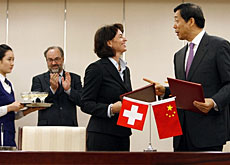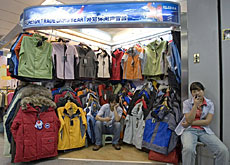Swiss and Chinese move towards free trade deal

Economics Minister Doris Leuthard has signed a joint declaration with Chinese Commerce Minister Bo Xilai aimed at establishing a free trade accord.
Both countries have also agreed to set up bilateral working groups to promote investment and bolster the protection of intellectual property rights, according to a statement by the economics ministry.
As part of the deal Switzerland recognised China as a market economy – a key buffer against trade disputes between the two countries over the price applied to Chinese goods.
Leuthard said it was an important signal for China – a member of the World Trade Organization – to be given this status. She said the European Union had not yet done so.
In return China agreed to launch an internal feasibility study to examine the possibility of a free trade agreement with Switzerland.
“The studies will show whether the conditions are in place,” the statement said.
Leuthard did not however give a time frame. She said more talks were necessary to win approval from the Chinese government for such a deal.
Leuthard, leading a joint delegation of government and business officials, also met the vice-president, Hui Liangyu, and the deputy finance minister, Zhu Guangyao, during the four-day visit to China before travelling to Vietnam.
Recognition
For his part Bo hailed the good relations between China and Switzerland at Sunday’s news conference in Beijing.
The Swiss evaluation of China’s development of a market economy confirmed the solid foundation for closer economic and trade ties, according to a statement.
“China has not forgotten that Switzerland was one of the first Western countries to officially recognise the new China,” Bo added, referring to the 1950 diplomatic recognition of the Communist regime.
Leuthard and Bo also agreed to improve the protection and enforcement of intellectual property rights. A working group made up of government officials and business representatives is to establish regular dialogue.
Swiss industry, notably the watchmaking sector, has been hampered by commercial piracy of products, machines and technical processes.
Human rights were not an issue during talks with the ministers, Swiss officials said.
Government strategy
Experts say Leuthard’s visit underscores the Swiss government’s foreign trade policy, which focuses on the emerging economies of Brazil, Russia, India and China.
China’s economy has grown by an average of ten per cent per year since 2003, making it attractive for foreign companies.
However, high import tariffs on watches – apart from widespread forgeries – have made it difficult for the Swiss watchmaking industry to expand in the Chinese market.
For its part the Swiss banking sector is keen to see restrictions eased further.
Urs Roth of the Swiss Bankers Association said China had made a big step towards liberalising the industry, but foreign banks were still hampered by special regulations.
The Swiss Business Federation said the Chinese market presented excellent opportunities for Swiss companies, despite some difficulties.
Federation President Gerold Bührer said a key factor was the long-standing presence of Swiss firms in China, which is Switzerland’s second-most important trading partner in Asia behind Japan.
swissinfo with agencies
China is one of the key countries for Swiss foreign trade policy.
It is the number two trading partner in Asia and ranks third and fourth – behind the EU, the US and Japan – as exporter to and importer from Switzerland.
The machinery industry accounted for nearly 50% of Swiss exports to China in 2005, with a further ten per cent each for the chemical industry and the watchmaking sector.
In 2002 Switzerland opened a business hub in the capital, Beijing, including subsidiaries in Guangzhou and Shanghai, in a bid to boost Swiss companies and investment in China.
A mixed delegation of the Swiss economics ministry and Swiss business representatives visited China in 2005.
Exports to China: SFr3.47 billion ($2.85 billion) or 2.1% of overall Swiss exports, according to 2005 figures by Seco.
Machinery industry: SFr1.67 billion (+3.7% on 2004)
Chemical products: SFr362 million (+37%)
Watchmaking: SFr352 million (+26%)
Pharma products: SFr260 million (+24%)
Optical and medical instruments: SFr252 million (+11%)
Exports account for 2.1% of total Swiss exports in 2004.
Imports from China: SFr3.38 billion, or 2.1% of Switzerland’s imports.
Machines: SFr826 million (+13%)
Textiles: SFr586 million (+13%)
Chemical products: SFr436 million (+66%)
Watchmaking: SFr305 million (+20%)

In compliance with the JTI standards
More: SWI swissinfo.ch certified by the Journalism Trust Initiative



You can find an overview of ongoing debates with our journalists here . Please join us!
If you want to start a conversation about a topic raised in this article or want to report factual errors, email us at english@swissinfo.ch.